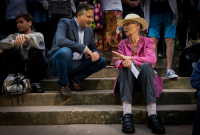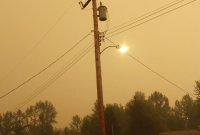Support strong Canadian climate journalism for 2025
The smoke from B.C.'s wildfires threw a wrench into Neil Johnston's training schedule.
Johnston, an ultramarathonner and member of Vancouver Frontrunners, was one of many outdoor enthusiasts who saw their routines dashed by the smoky haze that loomed over B.C. in the wake of the second worst wildfire season on record in the west coast province.
"I've gone from running six days a week, doing 70-80 kilometres, to almost none for the past couple of weeks, other than trying to go out for a big run on the weekend," Johnston told National Observer on Saturday. Although he still trained, he travelled out of town to find areas with cleaner air.

Johnston has asthma and running in town posed a particular challenge, since smoke can set off a cascade of negative health impacts.
To balance health with outdoors pursuits, Johnston recently drove out for over one hour north of Whistler to run in the mountains, keeping in touch with his partner, who would keep him updated on fire locations and air quality. He knows other runners who have had to abandon their usual training spots due to bad air quality.
"I know a couple of people who did the Grouse Grind (a trail on Grouse Mountain in North Vancouver) on bad days, and ended up regretting it," Johnston said. "They were hacking and wheezing afterwards."
Provincial health officer Bonnie Henry advised in an August 24 video that people should try to exercise indoors, rather than outside, on days with heavy smoke.
App for wildfire conditions
Johnston, a user experience and interface designer, designed an app, BC Fire Map. The app provides updates on where the fires start and which areas in B.C. are still safe for hiking and running. He invented the app last year, when his parents were evacuated from the Williams Lake area, and he has been improving it ever since.

"Last year, it was just a scatter of information everywhere," he said.
Frustrated, he created an app that shows evacuation orders, fires, and fire perimeters on a single map, which is kept up to date with government data and satellite detection of fire starts from NASA and NOAA.. He said his friends in the outdoor and adventure community have been using it to decide where they can safely go for sports, and that people facing evacuations are also finding it useful.
Impact on tourism
Johnston said he worries about the impact of annual wildfire emergencies on B.C., often dubbed "Super Natural B.C." for its thriving outdoor tourism. Although the air quality has improved in recent days, causing the province to cancel its air quality advisory in Metro Vancouver, damage has already been done to B.C.'s premier outdoors races.
Scientists from Natural Resources Canada say that wildfire activity in the country rose steadily in the last half of the 20th century due, in part, to climate change. They also say that under a worst case scenario, the trees in big parts of the boreal forest are going to disappear as climate change accelerates wildfires, droughts and pest infestations.
In Central Canada, Ontario has also struggled to battle more than 100 wildfires this summer, getting a hand from more than 300 firefighters from Mexico. At the same time, recent heat waves in Ontario and Quebec have claimed dozens of lives.
Governments and scientists from around the world have agreed that humans can mitigate the risks of these types of incidents by reducing consumption of fossil fuels such as oil, gas and coal.
In B.C., wildfires also forced the cancellation of major events such as Kelowna's Apple Triatholon and the Fat Dog 120, sparking tears and anger from runners signed up for the race. Fat Dog 120, in particular, is known as one of North America's toughest ultramarathons at 193 kilometres, and was called off just two days before the start date.
"This is something a lot of folks ramp up all year to do, to do their one or two big races," said Johnston, whose friends had signed up for Fat Dog 120.

Even though wildfires are an annual threat, Johnston said it's been noticeably more intense in the past two years, and that wildfires would impact B.C.'s reputation if the emergency situation became recurring every year.
"I absolutely do worry," Johnston said. "In late summer, you're faced with unhealthy training conditions, unhealthy racing conditions. It changes the viability of B.C. in terms of an outdoor community."
He said given the nature of climate change, it may be the "new reality" of what B.C.'s summers are going to be.
A spokeswoman from Destination BC, an industry-led Crown corporation working to promote tourism in the province, said the impact of wildfires has been limited, and that it's too soon to say if the smoke would become an annual problem.
"We have not heard of any evidence that suggests this would be the new normal," said Destination BC spokeswoman Kristen Learned. "In speaking with our regional partners, we have heard of only a few cancellations (such as the two triathlons in the Okanagan last weekend); it does not seem to be an ongoing issue for the province to date. Across B.C., we are part of a collaborative effort to sustain our province’s strong tourism industry, while ensuring that the health of visitors, event participants and viewers remain a top priority."
She said event hosts make the call whether to cancel based on real-life conditions, and that a dragon boat race in Steveston, B.C., went off without a hitch and welcomed 15,000-20,000 visitors as the weekend rain brought in fresh air, allowing athletes to safely compete.
But for runners and outdoor adventurers, there aren't a lot of alternative locations on the west coast where people can train while B.C. is on fire.
"Where else? That's the problem," he said. "California's on fire currently. The smoke and air conditions between here and California aren't great. So we have to squeeze in outdoor pursuits before fire season, or after fire season."
"It will change everything from tourism all the way through to adventure sports to people who work outside."







Comments
How shocking - that those who live to run - are suddenly realizing that running, requires uncontaminated oxygen! Which is what all living things require and what we are all destroying with our CO2 emissions, and all the toxins our industries have spewed into our precious atmosphere for generations. Save the planet anyone?